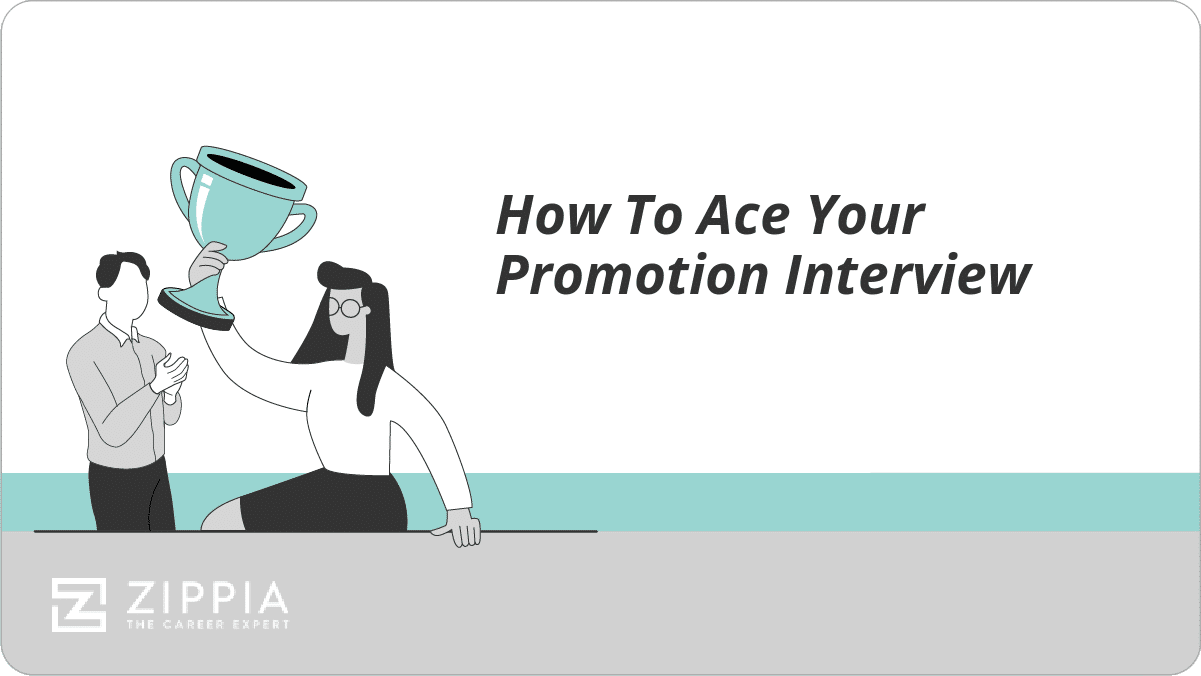- Interview Prep
- Star Method For Answering Questions
- Interview Preparation Checklist
- Star Interview Questions
- Words To Use In An Interview
- Mock Interview Preparation
- How To Make A Good Impression
- Bring Writing Samples
- How To Relax Before An Interview
- Interview Coaching
- Common Video Interview Mistakes
- Common Phone Interview Mistakes
- How To Ace Your Interview For A Remote Job
- Good Weaknesses For A Job Interview
- Good Strengths For A Job Interview
- How To Prepare For A Phone Interview
- Talk About Being Laid Off
- How To Decline An Interview
- How Early Should You Arrive For An Interview
- Types Of Interviews
- Communication
Find a Job You Really Want In
Don’t make the mistake of thinking a promotion interview is the same thing as your standard job interview. While elements of it are the same, a promotion interview requires unique preparation.
In this article we will go over how to prepare for a promotion interview, give you sample questions with answers, and give you tips for what to do after the interview.
Key Takeaways:
-
When preparing for a promotion interview, be sure to tell you supervisor, prepare for the interview like you would any interview, and make sure you highlight why you are the best candidate for the position.
-
It’s important to remember not to burn any bridges with your coworkers while in the interview process because there is still a chance you may not get the promotion.
-
When going into the interview, you may have an advantage against external candidates but it is important to treat this if you didn’t have connections with the hiring manager.

What is a Promotion Interview?
A promotion interview, also known as an internal interview, is an interview where the candidate already works at a lower or different position within the organization. A lot of organizations will require internal candidates to go through the same hiring process as external candidates.
That being said, many companies prefer to hire internally for certain positions because they know more about the candidates and, more importantly, the candidates already know about the company.
So that means you’re a shoo-in, right? Well, with your knowledge advantage, the company also has higher expectations of you. That means you should expect tougher questions and be ready with mountains of evidence for why you’re the best candidate for the job.
How Prepare for a Promotion Interview
As stated earlier, there are elements of a promotion interview that are the same as any old interview. As such, some of the most popular interview tips (maintain eye contact, dress to impress, etc. ) apply here as well. The following tips are more specific to a promotion interview.
-
Talk to your supervisor. Before you start gunning for a promotion, you should talk to your boss. That way, it doesn’t seem like you’re going behind their back and they don’t hear about it from someone else.
Additionally, this conversation will help you see how your supervisor views your contributions, which can provide extra evidence of your awesomeness during the interview. He or she might even have some insider tips that’ll help ace your interview.
-
Research the job/interviewers. Same as any interview, you want to review the responsibilities of the role for which you are applying. The only difference is that you’re an internal applicant, so you have greater access to more up-to-date info. You can even talk to the person whom you’ll be replacing to learn more about the position.
It’s also a good idea to do your homework on your interviewer(s), especially if it’s someone you’ve never worked with before. If you’re able to bring their work experience into the conversation, that can only be to your advantage.
-
Review company knowledge. In the same vein as the tip above. As an internal applicant, you probably already have a good understanding of the corporate culture and your company’s goals. However, it can’t hurt to review their mission statement and re-familiarize yourself with the company’s vision.
Additionally, knowing what projects are in the pipeline will help shape your responses. If you already have intimate knowledge about how you’d handle a coming project, that’ll help you shift the conversation from “you” to “we” and make it easier for hiring managers to visualize you in the new position.
-
Follow the hiring process protocol. It’s good to be confident, but don’t expect that you’re a shoo-in just because you’re an internal applicant. Whatever the rules of the hiring process are, follow them, just as any other candidate would. Don’t try to sneak around the system or rely on personal relationships to land your promotion.
-
Maintain professionalism. Look, you might already be best buds with someone on the hiring committee, but don’t let that detract from a professional attitude. Take this seriously and show the interviewer that you’re the best candidate for the job on merit, not nepotism.
-
Be ready to brag. Just like any interview, you should be ready with a brag book. Highlight your skills and experience that are relevant for the new position. You’re already showing your commitment to the company by applying internally, so use that to your advantage.
Show, don’t tell applies here as well. Use the STAR method (situation, task, action, result) to structure your stories. Come with numbers and any relevant documents that showcase how you’ve already made many positive contributions to the company.
-
Ask questions. Just because you know more about the company and the role than a typical external applicant, that doesn’t mean you know everything. Failing to ask questions can make you look overconfident or like you don’t care about the specifics of the new role.
Focus on the responsibilities of the new position, how you’ll fit into the team, and what your transition would look like. Your curiosity shows that you’re very serious about succeeding in this new job.
Promotion Interview Questions and Sample Answers
-
Why do you want to change roles?
In the four years I’ve worked at my current position, I’ve grown so much and learned more about the industry. If promoted to this new role, I would be able to apply my new skills and knowledge to effectively lead our team. I would be able to make a greater contribution to the company’s growth goals.
I would also be able to step into a leadership role where I could support and mentor others, which has always been a passion of mine.
-
What do you like most about your current role?
I have enjoyed working at a company that values teamwork above all else. My team has been phenomenal and I’ve learned so much working with them. Streamlining processes and finding a groove where all of us can pursue our passions while keeping the company’s vision at the forefront has been immensely rewarding.
-
What has been your greatest success story in your current role?
When I started here as a sales representative, I thought I was a natural salesman. I figured out that I still had a lot of learning to do when I failed to meet my sales quota during my first quarter.
However, by talking to my team members and supervisor, I was able to pinpoint my weak areas, and since my first quarter, I’ve always exceeded sales quotas by at least 20%, which I’m very proud of.
-
Why do you want to leave your current position?
Working with the social media team has been an experience I wouldn’t trade for anything. I’ve acquired new skills and built relationships that have helped my professional development. However, I feel that my passion really lies with website development, and after taking time to learn new coding languages, I am excited to apply my new skills in a different environment.
-
Why should we consider you for this position?
In my current position, I’ve been able to streamline how we handle client feedback. My team consistently gets higher customer reviews than the company average, and a big part of that has been the new system I helped devise. I also think I’m a natural team-player who can motivate others to work to their full potential, which is something I’d get to do a lot more of in this new role.
-
What would you do during your first month on the job?
The first item on my agenda would be clarifying the short-term and long-term goals of our company and our team. I would then communicate these goals to my employees so we could all be on the same page. I would also review my team’s current workflows and make adjustments to increase efficiency.
-
How would your co-workers describe you?
My co-workers would describe me as diligent and detail-oriented. In the past, I’ve always been the one to catch little mistakes in projects and notify people well ahead of deadlines. My team has even nicknamed me “failsafe” because they see me as the last line of defense for catching errors.
-
Tell me about an occasion where you were tasked with something you’d never done before.
Last year, when our customer service representative was in the hospital, each team had to elect a developer to liaise with one client. I accepted this responsibility, and my first course of action was to reach out to co-workers who had relevant experience.
I then reviewed materials left by the absent customer service rep and researched what was expected. I was able to organize an outline and break the assignment into mini-projects so that I could talk the client through every step of our process. We actually received a perfect 10/10 customer satisfaction survey at the end.
-
How will this promotion change your current work relationships?
I always strive to create an inclusive and positive workspace. If promoted, I would maintain my current work relationships with open and honest communication.
-
What part of this position will be the most difficult for you?
Moving from entirely internal responsibilities to a more client-facing role will be a big change for me. However, I think the communication skills I have developed in my current role will serve me well when dealing with clients in the future.
-
What training or resources would you need to succeed if you are promoted?
I know that this new position would require a greater knowledge of programming languages, and I’ve begun taking Python courses to get a head start on my training. Having access to such great programmers on my new team would help me develop my skills and grow at a faster pace so that I can start making greater contributions to the company.
-
How do you motivate your team members?
A few quarters ago, our sales team saw a dip in our numbers. Our supervisor asked us to come up with systems to improve our sales and my idea was chosen as one to implement. We adjusted our incentive system, made how commissions work more transparent, and added extra bonuses for top performers. That system has stayed in place and our sales team has continued to exceed expectations ever since.
-
What are your salary requirements?
While I am flexible, I am looking to receive between $76,000 and $83,000 annually. This is based on research I’ve done for similar positions in this area.
-
What are your career goals and how does this promotion fit into them?
I hope to rise to the position of senior data analyst in the next few years. Starting as a junior data analyst will help me grow as a professional. This new position offers greater training and on-the-job experience that will increase my potential to contribute to the company’s short and long-term goals.
-
How will you react if you don’t get this promotion?
I’ll certainly be disappointed that I can’t make as big of a contribution to the company. However, I understand that the company has to do what they feel is in their best interest. I have full faith that you’ll hire the candidate who is best able to handle the responsibilities of the job. Additionally, I will continue to perform at a high level on my current projects and look for different ways to add value to the company.
Other questions that may be asked during a promotional interview:
-
What is your greatest strength?
-
What is your greatest weakness?
-
What do you know about the position and the people you’d be working with?
-
How do you handle a challenging situation?
- What sets you apart from other candidates?
What Should You Ask During a Promotion Interview?
An interview isn’t a one-way street — you should have some questions prepared as well. For one, your questions will express a deep interest in the position and intimate knowledge of what the position entails. Additionally, you want to learn as much about the promotion as you can, so that you’re ready to tackle your new responsibilities right away.
While this isn’t a comprehensive list, use it as a jumping-off point for developing pertinent questions to ask during your promotion interview.
-
What are the biggest challenges that a person in this position will likely encounter?
-
What are the most important things I can do to succeed in my first month on the job?
-
How is performance evaluated for this position?
-
What departments will I be collaborating with most often?
-
What kind of opportunities do you offer for professional development?
-
Why is this position available now?
-
What did my successor do right to succeed in this position?
-
What are the most important skills for a person to possess to succeed in this position?
-
What would my transition into the new role look like?
-
When can I expect to hear back from you?
Tips For After the Interview
-
Express gratitude. Don’t take this too casually as an internal applicant. Even if you’ve thanked everyone in person and your interviewers are people you see around every day, you should still write a thank-you email to everyone who was involved in your interview process. Reiterate how interested you are in the position, how qualified you are, and your gratitude for being considered.
-
Don’t burn any bridges. This applies regardless of if you do or don’t get the promotion in the end. Maintain professionalism throughout the process. If you’re about to supervise people you worked with (who may have applied for the position you just promoted to), continue treating them with respect. Once you know the promotion is happening, wait for the company to announce it to your co-workers (if they plan on doing that) before you let everyone know that you’re moving up.
On the flip side, if you don’t get the promotion, try not to take it personally. If you become really negative and less productive after failing to get the promotion, you’ll certainly hurt your chances the next time promotion talks start up again. Or if you decide to start applying externally, your pouty response will hurt your odds at a good letter of recommendation.
-
Keep excelling at your job. You have one major advantage over external candidates — your day-to-day work at your current role speaks louder than any resume or cover letter can. Make sure it truly is an advantage by performing your job at a high level.
If you have made mistakes in the past (who hasn’t?), take time to consider how you’ve grown and improved as a result of them. That way you can show off both your accountability and your professional development in one go.
Expert Opinion
How To Ace Your Promotion Interview

Doug Fogel
Professional resume writer, life coach and career development coach
With your knowledge advantage, the company also has higher expectations of you. That means you should expect tougher questions and be ready with mountains of evidence for why you’re the best candidate for the job. You should start presenting that evidence before the interview.
How do you do that?
Simple – Make sure your interviewers have your updated resume well ahead of the interview itself.
And also make sure your resume highlights major accomplishments you’ve achieved since you started working at your current position.
This will plant into the minds of your interviewers how valuable you are to the company (a good thing, right?).
It will also give you tangible talking points to bring up during the interview.
- Interview Prep
- Star Method For Answering Questions
- Interview Preparation Checklist
- Star Interview Questions
- Words To Use In An Interview
- Mock Interview Preparation
- How To Make A Good Impression
- Bring Writing Samples
- How To Relax Before An Interview
- Interview Coaching
- Common Video Interview Mistakes
- Common Phone Interview Mistakes
- How To Ace Your Interview For A Remote Job
- Good Weaknesses For A Job Interview
- Good Strengths For A Job Interview
- How To Prepare For A Phone Interview
- Talk About Being Laid Off
- How To Decline An Interview
- How Early Should You Arrive For An Interview
- Types Of Interviews
- Communication





